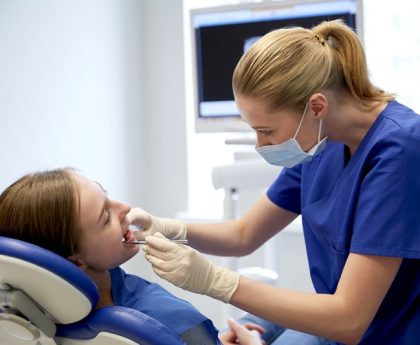Oral health often mirrors general health conditions, including whether you are getting enough nutrients. Poor nutrition reflects through signs in our teeth and gums and can lead to serious dental issues. Spotting nutritional deficiencies early helps keep your mouth and body healthy. Learn how to identify common signs of nutritional gaps through examining your teeth, gums, and oral tissues.
Common Signs of Nutritional Deficiencies in Oral Health
Nutritional deficiencies directly impact your oral well-being, causing specific noticeable symptoms. Identifying these symptoms early allows you to address shortages promptly. The following are primary indicators of poor nutrition that appear in your mouth:
-
Bleeding or inflamed gums
-
Loose teeth or weakened tooth enamel
-
Mouth ulcers or slow-healing sores
-
Cracked or dry lips (chelitis)
-
Bad breath unrelated to oral hygiene
-
Frequent infections or increased sensitivity
Bleeding or Inflamed Gums Linked to Vitamin C Deficits
Vitamin C is critical for healthy gums and tissues. Without enough vitamin C, gums often swell, turn red, and bleed easily during brushing or flossing. Gingivitis can develop if the deficiency persists, leading to worsening gum infection and possible tooth loss.
Besides citrus fruits, sources such as strawberries, bell peppers, broccoli, and leafy greens are excellent vitamin C providers. Including varied fruits and vegetables in your meals helps prevent vitamin C shortages and maintain strong, healthy gums.
Weakened Tooth Enamel and Vitamin D or Calcium Shortage
Vitamin D and calcium play essential parts in maintaining strong and healthy teeth. A deficiency causes teeth to weaken, leading to enamel erosion, cavities, sensitivity to hot or cold, and brittleness or breaking. This may result in the requirement to fix your smile with white resin bonding to restore your tooth appearance effectively.
Dairy products, fortified cereals, fatty fish, almonds, and green leafy vegetables are great dietary solutions. Regularly consuming these nutrient-rich foods supports dental health and helps avoid significant tooth-related issues.
Mouth Sores Indicating Iron or B-Vitamin Deficiency
Mouth ulcers and sores can result from deficiencies in iron or B vitamins such as B12, folate, or riboflavin. These nutrients contribute to tissue regeneration and healing processes inside the mouth. Prolonged deficiency not only causes sores but delays their recovery, leading to persistent discomfort.
Lean meats, beans, lentils, eggs, fortified cereals, and green vegetables are significant sources of these nutrients. Replenishing your iron and B-vitamin needs through balanced diet choices can significantly reduce mouth ulcer occurrences.
Dry or Cracked Lips Related to Vitamin B2 Deficiency
Dry, peeling, sore, or cracked lips (angular cheilitis) could indicate a shortage of vitamin B2, also known as riboflavin. Riboflavin deficiency affects tissue health around the mouth, causing lip discomfort and cracks at the corners of the mouth. Chronic dryness or lip cracking should prompt dietary evaluation.
Include dairy products, almonds, eggs, mushrooms, and fortified grains for robust vitamin B2 intake. Proper riboflavin consumption improves lip hydration, texture, and overall oral comfort.
Bad Breath from Zinc Deficiency
Persistent bad breath that doesn’t improve despite consistent oral hygiene might signal zinc deficiency. Zinc aids saliva production and helps control oral bacteria responsible for halitosis. Low zinc levels impair saliva quality, enabling bacterial overgrowth and resulting in unpleasant breath.
Incorporate zinc-rich foods like nuts, legumes, whole grains, and seafood into daily meals. Consuming adequate dietary zinc ensures balanced saliva production and better breath freshness.
Increased Sensitivity from Potassium Deficiency
Tooth sensitivity, including sharp pain when encountering temperature extremes, sometimes relates to potassium shortage. Potassium regulates fluid balance in dental tissues, reducing tooth sensitivity to external stimuli. Deficiency disrupts this process, intensifying discomfort during regular dental activities such as drinking hot or cold beverages.
Rich potassium sources include bananas, potatoes, spinach, avocados, and dairy products. Ensuring consistent potassium intake alleviates tooth sensitivity and improves overall dental comfort.
Diagnosing Nutritional Deficiencies Through Oral Exams
Regular dental check-ups contribute to early detection and proper diagnosis of nutritional deficiencies. Dentists are trained to identify oral manifestations of various nutritional shortages, recommending dietary changes or supplements accordingly. Maintaining routine dental exams supports quicker recognition and resolution of nutritional issues.
Additionally, sharp-eyed pharmacists, dietitians, or family doctors may support nutritional evaluations based on oral presentations. Sharing dietary habits, medical histories, and oral symptoms with healthcare providers enables comprehensive treatment plans.
What Can You Do if You Have Lost Teeth Due to Nutritional Deficiency?
Tooth loss resulting from severe nutritional deficiencies is a critical problem demanding immediate attention. Options exist for rebuilding and restoring the complete functionality and aesthetics of your smile. For instance, you may opt to get a full smile with implant hybrids which can replace multiple missing teeth in a secure and lasting manner.
Implant-supported hybrids offer stability, natural appearance, and represent a long-lasting solution for tooth restoration. Discussing suitable tooth-replacement therapies with dental professionals aligns solutions with personal preferences and budget considerations.
Seek Professional Advice to Ensure Correct Diagnoses
Deficiencies affecting oral health symptoms can overlap or result from other health conditions. Obtaining accurate clinical lab tests and professional assessments ensures proper identification of underlying nutritional problems. Blood tests commonly identify concrete deficiencies and facilitate targeted nutritional interventions to reclaim overall oral wellness.
Consulting closely with dental healthcare providers ensures proper guidance in response to nutritional deficiency symptoms. Combining professional dietary advice with dental care optimizes comprehensive oral health management.
Treat and Prevent Nutritional Deficiencies with Diet Changes
Preventing oral health problems initiated by deficiencies involves adequate daily nutrition. Balanced diets containing varied fruits, vegetables, lean proteins, whole grains, and essential fatty acids boost dental wellbeing naturally. Adopting long-term healthy eating habits stabilizes nutritional intake, positively influencing oral health.
Consider nutritional supplements only after professional recommendation, ensuring correct dosages to avoid overdosing. Balanced supplementation and lifestyle modifications nurture a healthful oral environment, preventing recurrent deficiencies over time.
Restoration Through Professional Dentistry
If oral damage occurs from sustained nutritional deficits, prompt intervention from dental professionals becomes essential. Dentistry offers techniques and procedures specially designed to rehabilitate worn-out teeth and inflamed gums. Effective restoration treatments significantly improve quality of life and confidence levels.
You could seek the assistance of an expert in crowns, bridges, and dentures to explore personalized approaches. Such dental specialists utilize advanced techniques tailored uniquely, correcting specific dental problems originating from nutritional shortages.
Closing Remarks
Awareness of nutritional deficiency signs impacting dental health provides earlier opportunities for management. Observing symptoms like bleeding gums, mouth sores, dry lips, and weakened teeth encourages immediate nutritional adjustments. Always pursue proper diagnosis, dietary consultation, and professional dental care to promote comprehensive oral health and overall wellness.





